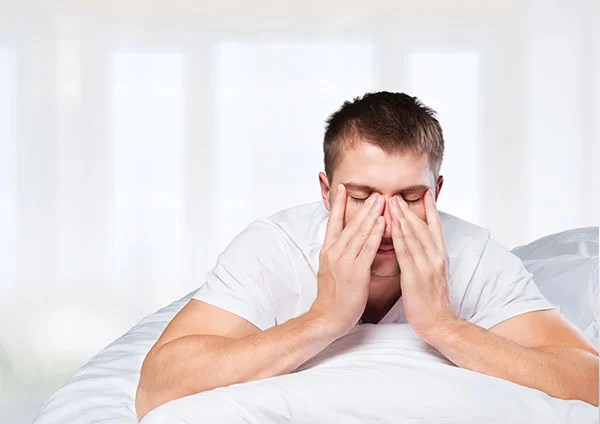Sleep Apnea vs. Snoring in Green Bay, WI
Is Your Snoring More Than Just a Nuisance?
If you or your bed partner complains about loud snoring at night, it may be tempting to brush it off as just a nuisance. But in some cases, snoring can be a warning sign of a serious sleep disorder called sleep apnea.
At our dental office in Green Bay, WI, dentists Dr. Daniel Fama and Dr. Kyle Whiteside specialize in identifying the difference between chronic snoring and sleep apnea symptoms. We provide advanced sleep apnea treatment options, including oral appliance therapy, to help patients breathe easier and enjoy a good night’s sleep.
Call our Green Bay dental clinic at (920) 339-8980 to schedule a sleep apnea consultation near you. We proudly serve patients in Allouez, Abrams, Denmark, Casco, Seymour, and surrounding communities.
What Is Snoring?
Snoring occurs when air passes through partially blocked air passages in the throat, nose, or soft palate, causing the surrounding soft tissues to vibrate. While snoring isn’t always a medical concern, chronic snoring can disturb your sleep partner and may signal a more serious condition.
Common Causes of Snoring
Smoking can be caused by various factors, including:
- Excess weight or obesity (narrowing the airway)
- Nasal congestion or allergies
- Sleeping position, especially on your back
- Alcohol or sedative use before bed
- Age-related muscle relaxation in the throat and tongue
- Family history of chronic snoring
Simple lifestyle changes—like weight loss, reducing alcohol intake, and positional therapy—can help reduce snoring. But if your snoring is loud and persistent, it’s best to get a sleep test to rule out sleep apnea.
What Is Sleep Apnea?
Unlike snoring, sleep apnea is a serious sleep disorder where you stop breathing during sleep—sometimes hundreds of times a night. Each pause in breathing lowers your blood oxygen levels and forces the brain to wake you up briefly, even if you don’t remember it.
Types of Sleep Apnea
- Obstructive Sleep Apnea (OSA): The most common form, caused when the throat muscles and soft tissues collapse and block the airway.
- Central Sleep Apnea (CSA): Less common, this happens when the central nervous system fails to send proper breathing signals to the muscles.
Both conditions can affect your breathing patterns, blood oxygen, and overall health if left untreated.
Symptoms of Sleep Apnea
You may need to see a sleep specialist near you if you notice:
- Loud, chronic snoring with pauses in breathing
- Gasping, choking, or waking up suddenly at night
- Morning headaches or dry mouth
- Excessive daytime sleepiness or trouble staying awake
- Difficulty concentrating or memory issues
- Irritability and mood changes
- High blood pressure or other heart problems
Snoring vs. Sleep Apnea: Key Differences
Snoring and sleep apnea are related conditions characterized by noise from vibrating tissues during breathing and repeated interruptions in breathing while asleep. The consequences can be disruptive but are usually harmless; however, they can lead to serious risks such as heart attacks, stroke, and high blood pressure. Common symptoms include:
- Noise that may disturb a bed partner
- Daytime fatigue
- Brain fog
- Morning headaches
Diagnosis typically involves a physical exam or reports from family members and requires a sleep study to monitor breathing and blood oxygen levels. Treatment options include:
- Lifestyle changes
- Snoring mouthpieces
- CPAP machines
- Oral appliances
- Surgical options
Diagnosis and Treatment Options
Sleep Apnea
- Diagnosis: A sleep study (polysomnography) tracks breathing, oxygen levels, and sleep patterns. Many patients can now complete a convenient at-home sleep test.
- Treatment Options:
- Lifestyle changes (weight loss, positional therapy, avoiding alcohol before bed)
- A Continuous Positive Airway Pressure (CPAP) machine that uses pressurized air to keep the airway open
- Oral appliance therapy that repositions the lower jaw and tongue to prevent airway collapse
- Surgical options in severe cases
- Other treatments to address underlying health conditions, such as allergies or nasal obstruction
Snoring
- Diagnosis: Often identified by your sleep partner or through a consultation with a dentist or physician. A sleep study may be recommended to rule out sleep apnea.
- Treatment:
- Avoiding alcohol and sedatives before bed
- Sleeping on your side instead of your back
- Snoring mouthpieces or oral appliances to keep air passages open
- Nasal strips or sprays to reduce nasal congestion
Frequently Asked Questions
Not always. Occasional snoring may be harmless, but loud, chronic snoring—especially if paired with gasping or pauses in breathing—may indicate sleep apnea. A thorough evaluation is the best way to know for sure.
Yes. Losing excess weight, treating allergies, avoiding alcohol, and adjusting sleep position can reduce or eliminate snoring for many adults.
Yes. Pediatric sleep apnea is often linked to enlarged tonsils or adenoids. Early treatment prevents long-term health issues.
Our dental team offers oral appliance therapy and works closely with sleep specialists in Green Bay to provide comprehensive care.
Take the First Step Toward Better Sleep in Green Bay
If you or your sleep partner is concerned about chronic snoring or sleep apnea symptoms, don’t wait to seek help. The risks—from daytime fatigue to serious heart problems—make it important to get a sleep test and treatment plan.
Call (920) 339-8980 today to schedule your sleep apnea consultation with Dr. Fama or Dr. Whiteside at our Green Bay dental clinic. We proudly serve Allouez, Abrams, Denmark, Casco, Seymour, and surrounding communities.


